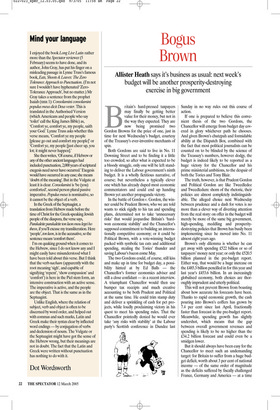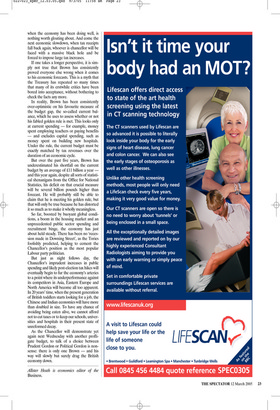Bogus Brown
Allister Heath says it’s business as usual: next week’s budget will be another prosperity-destroying exercise in big government Britain’s hard-pressed taxpayers may finally be getting better value for their money, but not in the way they expected. They are now being promised two Gordon Browns for the price of one, just in time for next Wednesday’s budget, courtesy of the Treasury’s ever-inventive merchants of spin.
Both Gordons are said to live in No. 11 Downing Street and to be finding it a little too crowded; so after what is expected to be a bloody struggle, only one will be left standing to deliver the Labour government’s ninth budget. It is a wholly fictitious narrative, of course; but nevertheless a typically clever one which has already duped most economic commentators and could end up handing Brown yet another propaganda victory.
In the battle of Gordon v. Gordon, the winner could be Prudent Brown, who we are told wants to stick rigidly to his tax and spending plans, determined not to take ‘unnecessary risks’ that would jeopardise Britain’s ‘hardwon economic stability’ and the Chancellor’s supposed commitment to building an internationally competitive economy; or it could be Political Brown, with a vote-winning budget packed with symbolic tax cuts and additional spending, stealing the Tories’ thunder and saving Labour’s bacon come May.
The two Gordons could, of course, still kiss and make up in time for budget day, a possibility hinted at by Ed Balls — the Chancellor’s former economics adviser and still a close confidant — in a recent interview. A triumphant Chancellor would then use bumper tax receipts and much creative accounting to be both Prudent and Political at the same time. He could trim stamp duty and deliver a sprinkling of cash for pet projects, while loudly proclaiming victory in his quest to meet his spending rules. That the Chancellor pointedly denied he would ever take ‘any risks with stability’ at the Labour party’s Scottish conference in Dundee last Sunday in no way rules out this course of action.
If one is prepared to believe this convenient thesis of the two Gordons, the Chancellor will emerge from budget day covered in glory whichever path he chooses. And given Brown’s chutzpah and formidable ability at the Dispatch Box, combined with the fact that most political journalists can be counted on to be blinded by the science of the Treasury’s numbers, however dodgy, the budget is indeed likely to be reported as a huge victory for the Chancellor and his prime ministerial ambitions, to the despair of both the Tories and Tony Blair.
The truth, however, is that Prudent Gordon and Political Gordon are like Tweedledee and Tweedledum: shorn of the rhetoric, their policies are almost completely indistinguishable. The alleged choice next Wednesday between prudence and a dash for votes is no more than a clever way of diverting attention from the real story: on offer in the budget will merely be more of the same big government, high-spending, meddling and prosperitydestroying policies that Brown has busily been implementing since he moved into No. 11 almost eight years ago.
Brown’s only dilemma is whether he can get away with spending £522 billion or so of taxpayers’ money next year; or only the £520.5 billion planned in the pre-budget report. Either way, that would be a huge increase on the £485.3 billion pencilled in for this year and last year’s £453.6 billion. In an increasingly globalised economy, both choices are thoroughly imprudent and utterly political.
This will not prevent Brown from boasting about how accurate his forecasts have been. Thanks to rapid economic growth, the cash pouring into Brown’s coffers has grown by 7.4 per cent since last April, fractionally faster than forecast in the pre-budget report. Meanwhile, spending growth has slightly undershot, which means that the gap between overall government revenues and spending is likely to be no higher than the £34.2 billion forecast and could even be a smidgen lower.
But it should always have been easy for the Chancellor to meet such an undemanding target: for Britain to suffer from a huge budget deficit, worth about 3 per cent of national income — of the same order of magnitude as the deficits suffered by fiscally challenged France, Germany and America — at a time when the economy has been doing well, is nothing worth gloating about. And come the next economic slowdown, when tax receipts fall back again, whoever is chancellor will be faced with a massive black hole and be forced to impose large tax increases.
If one takes a longer perspective, it is simply not true that Brown has consistently proved everyone else wrong when it comes to his economic forecasts. This is a myth that the Treasury has repeated so many times that many of its erstwhile critics have been bored into acceptance, without bothering to check the facts any more.
In reality, Brown has been consistently over-optimistic on his favourite measure of the budget gap, the so-called current balance, which he uses to assess whether or not his fabled golden rule is met. This looks only at current spending — for example, money spent employing teachers or paying benefits — and excludes capital spending, such as money spent on building new hospitals. Under the rule, the current budget must be exactly matched by tax revenues over the duration of an economic cycle.
But over the past five years, Brown has underestimated his shortfall on the current budget by an average of £11 billion a year and this year again, despite all sorts of statistical shenanigans from the Office for National Statistics, his deficit on that crucial measure will be several billion pounds higher than forecast. He will probably still be able to claim that he is meeting his golden rule, but that will only be true because he has distorted it so much as to make it wholly meaningless.
So far, boosted by buoyant global conditions, a boom in the housing market and an unprecedented public sector spending and recruitment binge, the economy has just about held steady. There has been no ‘recession made in Downing Street’, as the Tories foolishly predicted, helping to cement the Chancellor’s position as the most popular Labour party politician.
But just as night follows day, the Chancellor’s imprudent increases in public spending and likely post-election tax hikes will eventually begin to fur the economy’s arteries to a point where its underperformance against its competitors in Asia, Eastern Europe and North America will become all too apparent. In 20 years’ time, when the present generation of British toddlers starts looking for a job, the Chinese and Indian economies will have more than doubled in size. To have any chance of avoiding being eaten alive, we cannot afford not to cut taxes or to keep our schools, universities and hospitals in their present state of unreformed decay.
As the Chancellor will demonstrate yet again next Wednesday with another profligate budget, to talk of a choice between Prudent Gordon or Political Gordon is nonsense: there is only one Brown — and his way will slowly but surely drag the British economy down.
Allister Heath is economics editor of the Business.

































































 Previous page
Previous page